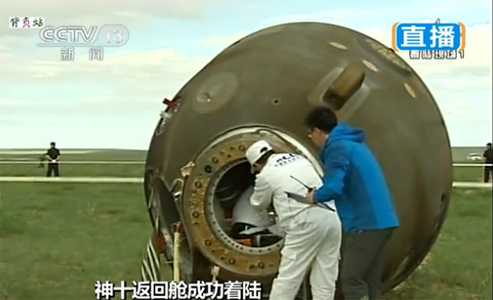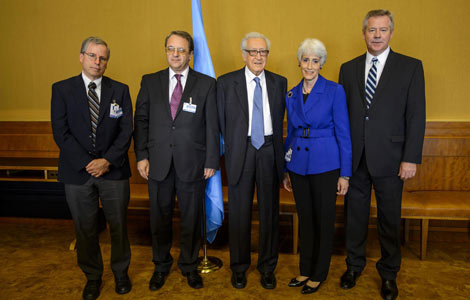It's time the US and China try a little space diplomacy
Updated: 2013-06-26 09:55
By Chris Davis (China Daily)
|
||||||||
The stunning success of the 15-day-long Shenzhou X mission - the longest stay in orbit for Chinese taikonauts since China started sending people into space in 2003 - raises the often-asked question : Why don't the US and China do something together in space?
A panel of space experts convened at the Stimson Center in Washington recently concluded that cooperative missions between the two countries could be done without jeopardizing national security or giving away state secrets, and it might help to ease tensions between the two nations. Fifty years ago, President John F. Kennedy called space an area where countries could cooperate. So what's the hold up?
For starters, it's prohibited. Representative Frank Wolf, a Republican from Virginia who is chairman of the subcommittee that controls NASA's purse strings, has written into the space agency's appropriations bill a provision that prohibits spending a penny on any joint project with China.
"They can't even discuss or have a meeting with us," John M. Logsdon, professor emeritus of political science and international affairs at George Washington University's Space Policy Institute, said in an interview. "That's not a very positive starting point for cooperation."

Sources who asked not to be identified said some of the senior leadership of NASA would love to work on projects with China, but they can't say so in public, given the imposed restrictions, which are reportedly motivated by Wolf's concerns over China's human rights issues.
George Kulacki, senior analyst and China project manager for the Union of Concerned Scientists, said that science is a global activity, and there are many areas of space science that could greatly benefit from the resumption of normal relations between space scientists in China and the US. Both countries are planning to place in orbit new scientific instruments that "will expand our understanding of different aspects of the universe", he said in an e-mail response to questions.
"Ideally, because of the limited resources available and the timescales involved, scientists in different parts of the world work together to field instruments that can observe and measure different phenomenon and then share the data, avoiding duplication and waste," Kulacki said.
"This kind of basic scientific collaboration, which is essential to the advancement of human knowledge, is impossible if scientists are forbidden from even talking to each other," he said.
Kulacki said the Congressional restrictions on NASA are having a chilling effect throughout the US space community.
"Even scientists who do not receive NASA funding are reluctant to engage their Chinese counterparts because they are afraid of Congressional retribution," Kulacki said. "With the exception of the president's science adviser, NASA and the rest of the Obama administration are too timid to fight back even though they disagree with the policies...
"In the absence of presidential leadership, a small clique of powerful legislators is being allowed to hijack the president's constitutional authority to conduct scientific diplomacy," Kulacki said.
But suppose it was allowed, what shape would this scientific diplomacy take?
Brian Weeden, technical adviser at the Secure World Foundation, cited in an interview a Congressional Research Service report that outlined three major categories for China-US cooperation in space: data sharing, a dialogue on policy and joint activities.
He also pointed to a joint statement issued by presidents Obama and Hu Jintao in 2011 where both leaders agreed to cooperate in space as long as a project was of mutual benefit, had reciprocity and built transparency between the two nations.
"That's a good way to think about it," Weeden said. "It has to be something where both the US and China are bringing something to the table and both have to feel like they got something out of it."
Weeden said that can be limiting, since China is still on a path to develop capabilities the US has already accomplished decades past, especially in human space flight.
That aside, Weeden said, there is, for instance, a renewed interest in tracking asteroids and whether any of them are a threat to Earth, a "non-controversial issue not tied to any serious national security issues".
Weeden said another possibility was in monitoring space weather. The US has aging satellites watching the surface of the Sun for storms and solar flares that need to be replaced and the US is struggling to find the money for it. That project has international cooperation written all over it and the cost - in the low hundreds of millions - would depend on how it is sliced. Would China put up its own satellite and trade its data for data from one of ours? Or is the satellite jointly funded with each country mounting its own sensors on it? Either way, any nation with satellites flying benefits from the solar flare reports.
To get joint efforts going, Weeden said, "Start with something that is fairly non-controversial, more towards the scientific end - because there has been and continues to be some scientific cooperation and exchange - and build up to something like human space flight."
Other experts believe that the only way to overcome the bureaucratic inertia on either side and really make a US-China joint space project happen is to get interest from the highest levels - the leaders themselves have to get behind it, the way President Richard Nixon did with the Apollo-Soyuz "handshake in space." And that is only going to happen with a manned mission.
"You're not going to get Obama to put a lot of personal effort behind just staring at the Sun," Weeden said.
Joan Johnson-Freese, a political scientist with the US Naval War College, said at the Stimson panel, "US restrictions on working with China in space are coming across as a bit of the mean girl in the international space community, as though we think we can just decide who is in the clique and who is not. That does not bode well for us in the spillover to larger geostrategic issues."
Meanwhile, a few eyebrows were raised at a recent House Armed Services Committee hearing when it was mentioned that the Pentagon, in order to improve communications in its Africa command, had leased bandwidth on Apstart-7, a satellite deployed by China in 2012.
So we're already there.
Contact the writer at chrisdavis@chinadailyusa.com
(China Daily USA 06/26/2013 page2)
Most Viewed
Editor's Picks

|

|

|

|

|

|
Today's Top News
Overseas sellers still upbeat on China
New canal a lifeline for energy
China, EU hold human rights dialogue
Shenzhou X capsule makes successful landing
Americans struggle over smartphones on vacation
Public interests Party's top priority
Chinese market open to US pork, govt says
Fed's QE3 decision causes stir
US Weekly

|

|















